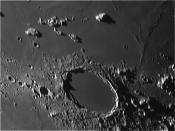Representing Visual Culture: Assignment 1Question 2.
To summarize PlatoÃÂs distrust of images, one must delve into the theological aspects of his philosophy, in particular ÃÂThe Analogy of the CaveÃÂ. In conjunction with Judeo-Christian beliefs about the veneration or abhorring of images, PlatoÃÂs ideas become less an hypothesis and more directly a doctrine to the existence of manÃÂs perception. PlatoÃÂs distrust is not of images it is of vision.
PlatoÃÂs apparent distrust of representations, together with his analogy of the cave can be traced back to his two main theological ideas: The relationship between what is eternal and immutable; and the flowing nature of everything tangible. PlatoÃÂs quest for the ÃÂtruthÃÂ led him to the conclusion that ÃÂwe can never have true knowledge of anything that is a constant state of changeÃÂ only of things that can be understood with our reason.ÃÂ(Plato, ÃÂSophieÃÂs WorldÃÂ, Jostein Gaarder, 1995.) It could also be said that PlatoÃÂs conflict is not with images themselves, but with manÃÂs vision; the ordinary manÃÂs perception, idolisation and close mindedness when faced with images.
As humanity itself is in a ÃÂconstant state of changeÃÂ, how may vision be trusted?PlatoÃÂs analogy of the cave verifies this theory, as it is not the images shown in shadow on the wall of the cave that is corrupt, but the cave-dwellers sight and judgement that is not to be trusted as truth. The insolent and ignorant dwellers have bound themselves into one position facing a wall and have grown so stiff that they cannot turn around to see the fire and the real figures behind where they sit, and further on still the light of day. One man, call him philosopher, escapes the confines of the ÃÂnormÃÂ and proceeds to help the others along the path of enlightenment, or the world of...


